10 Great Irish Writers
By Melissa Hellstern
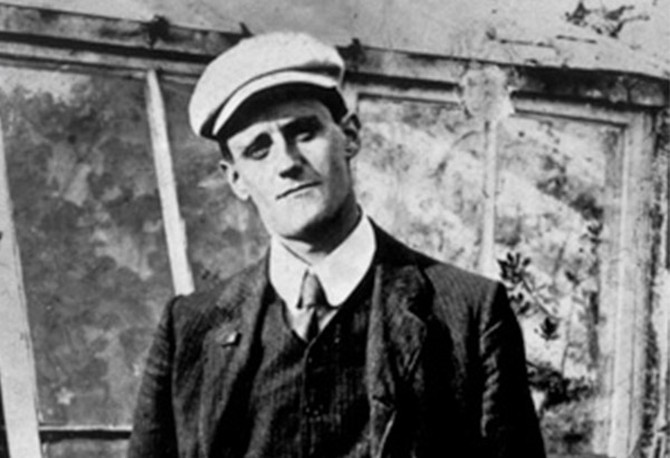
Getty/C.P. Curran
James Joyce
His first book, Dubliners, was rejected 22 times and sold fewer than 400 copies (120 of those to James Joyce himself) in its first year. Yet Joyce went on to simultaneously define the Modernist novel and Dublin in the early 20th century. Although Joyce lived most of his life in Paris, Trieste, Rome and Zurich, it was in his native Dublin that his characters and stories found life.
With the assistance of the poet and critic Ezra Pound, Joyce set the Modernist novel in motion with his own library of work—Dubliners, A Portrait of the Artist as a Young Man, Ulysses and Finnegans Wake. Praised as a Modernist masterpiece, Ulysses follows Leopold Bloom through an ordinary Dublin day, using inventive storytelling techniques including stream of consciousness and prose richly layered with puns, parodies, allusions and humor. In 1999, the Modern Library ranked Ulysses first on its list of the 100 best English-language novels of the 20th century.
More on the novels of James Joyce
With the assistance of the poet and critic Ezra Pound, Joyce set the Modernist novel in motion with his own library of work—Dubliners, A Portrait of the Artist as a Young Man, Ulysses and Finnegans Wake. Praised as a Modernist masterpiece, Ulysses follows Leopold Bloom through an ordinary Dublin day, using inventive storytelling techniques including stream of consciousness and prose richly layered with puns, parodies, allusions and humor. In 1999, the Modern Library ranked Ulysses first on its list of the 100 best English-language novels of the 20th century.
More on the novels of James Joyce
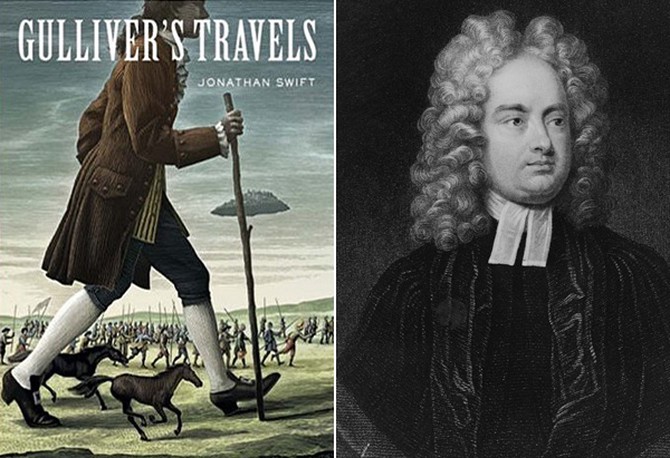
Getty/Time Life Pictures
Jonathan Swift
When Jonathan Swift published his first poem, the great poet (and distant relative) John Dryden is said to have remarked, "Cousin Swift, you will never be a poet."
Little did he know that Swift would go on to become a master satirist. In his first essay, A Modest Proposal, Swift mocked the authority of British officials by suggesting that Ireland's poor escape poverty by selling their children as food for the wealthy. "I have been assured ??? that a young healthy child well nursed is at a year old a most delicious, nourishing, and wholesome food, whether stewed, roasted, baked, or boiled."
But it is the fantastic adventures in Gulliver's Travels, a brilliant combination of humor and philosophy, for which Swift is best remembered. Considered a classic almost as soon as it was published, Lemuel Gulliver takes us traveling to distant lands such as Lilliput, where people are 6 inches tall, and has never been out of print since it first hit shelves in 1726. Gulliver's Travels remains one of literature's most durable masterpieces.
Little did he know that Swift would go on to become a master satirist. In his first essay, A Modest Proposal, Swift mocked the authority of British officials by suggesting that Ireland's poor escape poverty by selling their children as food for the wealthy. "I have been assured ??? that a young healthy child well nursed is at a year old a most delicious, nourishing, and wholesome food, whether stewed, roasted, baked, or boiled."
But it is the fantastic adventures in Gulliver's Travels, a brilliant combination of humor and philosophy, for which Swift is best remembered. Considered a classic almost as soon as it was published, Lemuel Gulliver takes us traveling to distant lands such as Lilliput, where people are 6 inches tall, and has never been out of print since it first hit shelves in 1726. Gulliver's Travels remains one of literature's most durable masterpieces.
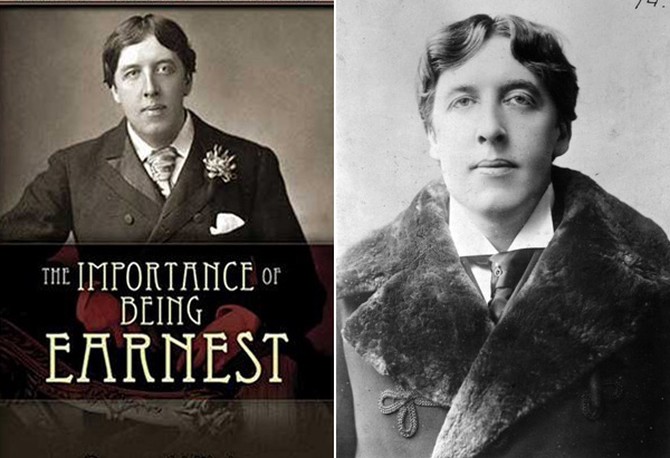
Getty/Alfred Ellis & Walery
Oscar Wilde
With his typical humor, Wilde once said, "Anyone who lives within their means suffers from a lack of imagination." Known equally for his lavish lifestyle, flamboyant dress and biting wit, Dublin-born Oscar Wilde became one of the best-known personalities of his day. He gained fame as one of the most successful playwrights of the late Victorian era in London and is especially remembered for An Ideal Husband and his final masterpiece, The Importance of Being Earnest. His only novel, The Picture of Dorian Gray, is as much a classic work of Gothic fiction as it is a timeless morality story about a man whose eternal beauty cannot mask his inner ugliness.
Married with two children, Wilde was put to trial and imprisoned for "gross indecency" with other men. The night of his release from prison, he set sail for France by the night ferry, never to return. He died destitute in Paris at the age of 46.
Married with two children, Wilde was put to trial and imprisoned for "gross indecency" with other men. The night of his release from prison, he set sail for France by the night ferry, never to return. He died destitute in Paris at the age of 46.
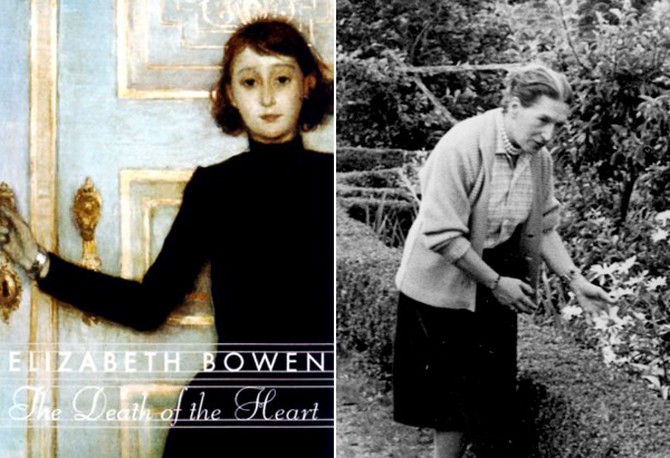
Getty/Hulton Archive
Elizabeth Bowen
By the age of 13, Elizabeth Bowen had lost her father to mental illness and her mother to cancer. By the age of 20, she was writing short stories and novels strongly influenced by Modernism and on her way to becoming a contemporary and friend to Virginia Woolf.
Dealing with profound universal themes including national identity, society and feminism, two of her well-known novels are set against the backdrop of war—The Last September and The Heat of the Day. But it is The Death of the Heart, published when she was 39, that has more than once been named as one of the 100 best modern novels.
"She had a great love of 19th-century British fiction, which she passed on to me, and she was receptive to 20th-century fiction and poetry of almost any stripe; it was from her that I learned to love the fiction of Eudora Welty and John Cheever, the poetry of e.e. cummings (her favorite) and Ogden Nash." — Jonathan Yardley, Book Critic for The Washington Post
More on Bowen's friendship with Carson McCullers
Dealing with profound universal themes including national identity, society and feminism, two of her well-known novels are set against the backdrop of war—The Last September and The Heat of the Day. But it is The Death of the Heart, published when she was 39, that has more than once been named as one of the 100 best modern novels.
"She had a great love of 19th-century British fiction, which she passed on to me, and she was receptive to 20th-century fiction and poetry of almost any stripe; it was from her that I learned to love the fiction of Eudora Welty and John Cheever, the poetry of e.e. cummings (her favorite) and Ogden Nash." — Jonathan Yardley, Book Critic for The Washington Post
More on Bowen's friendship with Carson McCullers
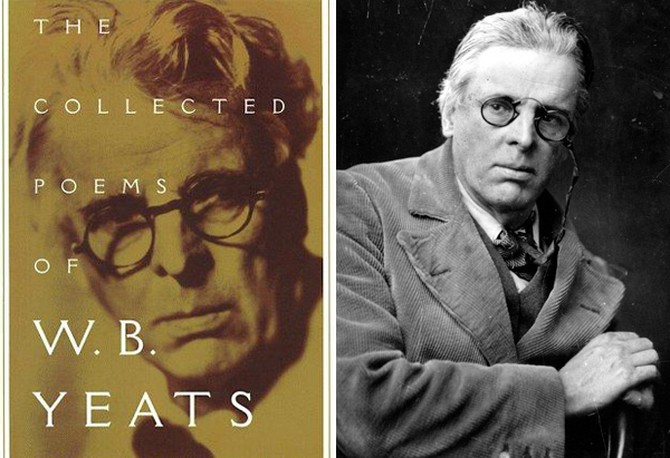
Getty/Hulton Archive
William Butler Yeats
An Irish poet, dramatist and one of the foremost figures of 20th-century literature, William Butler Yeats was born in Dublin, yet it was County Sligo that he called his "country of the heart." His works draw heavily on Irish mythology, history, mysticism and spiritualism. In 1892, he wrote, "The mystical life is the centre of all that I do and all that I think and all that I write."
A master of traditional forms in a land of Modernist poets, Yeats reigned as a pillar of both the Irish and British literary establishments and was a driving force behind the Irish Literary Revival and a founding member of the Abbey Theatre. Later in life, he served as an Irish senator for two terms. Yeats was awarded the 1923 Nobel Prize in Literature for "inspired poetry, which in a highly artistic form gives expression to the spirit of a whole nation." He was the first Irishman so honored, notably in the year following Irish independence.
What Bono learned from Yeats
A master of traditional forms in a land of Modernist poets, Yeats reigned as a pillar of both the Irish and British literary establishments and was a driving force behind the Irish Literary Revival and a founding member of the Abbey Theatre. Later in life, he served as an Irish senator for two terms. Yeats was awarded the 1923 Nobel Prize in Literature for "inspired poetry, which in a highly artistic form gives expression to the spirit of a whole nation." He was the first Irishman so honored, notably in the year following Irish independence.
What Bono learned from Yeats
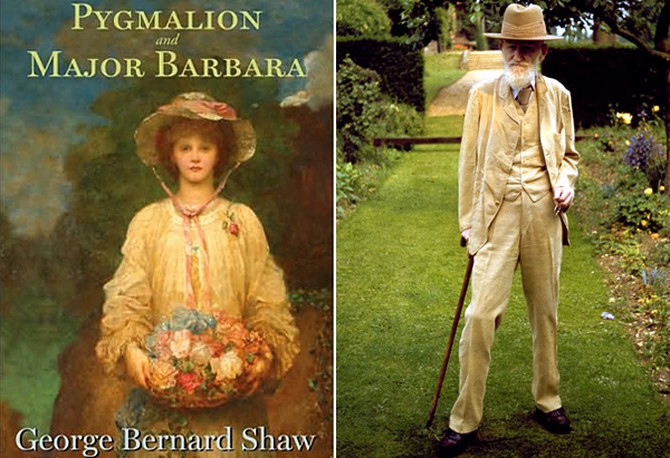
Getty/Hulton Archive
George Bernard Shaw
With more than 60 plays to his name, George Bernard Shaw was an expert at using a little comedy to lighten up a social message. A reformist socialist, he once said: "My way of joking is to tell the truth. It's the funniest joke in the world." Shaw was a member of the Fabian Society and a founding member of the London School of Economics and Political Science, now a part of the University of London. He was also an avid amateur photographer.
Shaw is the only person to have been awarded both a Nobel Prize for Literature (1925) and an Oscar® (1938), the latter for his work on the film Pygmalion, which became the basis for the popular Audrey Hepburn film My Fair Lady. Shaw wanted to refuse his Nobel Prize, saying he had no desire for public honors, but he accepted it as a tribute to Ireland instead. He did however reject the monetary award. About the refusal, Shaw famously said, "I can forgive Alfred Nobel for having invented dynamite, but only a fiend in human form could have invented the Nobel Prize."
Shaw's first novel, Immaturity, was written at the age of 23. Yet it did not published until he was 75. Shaw lived to be 94.
Shaw is the only person to have been awarded both a Nobel Prize for Literature (1925) and an Oscar® (1938), the latter for his work on the film Pygmalion, which became the basis for the popular Audrey Hepburn film My Fair Lady. Shaw wanted to refuse his Nobel Prize, saying he had no desire for public honors, but he accepted it as a tribute to Ireland instead. He did however reject the monetary award. About the refusal, Shaw famously said, "I can forgive Alfred Nobel for having invented dynamite, but only a fiend in human form could have invented the Nobel Prize."
Shaw's first novel, Immaturity, was written at the age of 23. Yet it did not published until he was 75. Shaw lived to be 94.
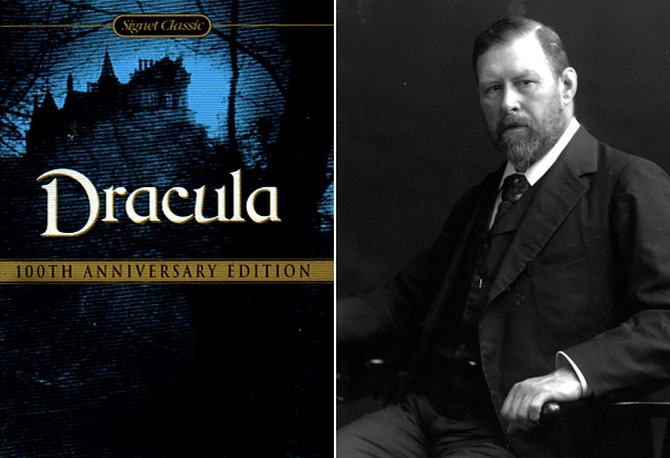
Getty/Hulton Archive
Bram Stoker
A man whose name is synonymous with vampires, Abraham "Bram" Stoker could have easily gone down in history as the business manager of famed actor Henry Irving's Lyceum Theatre in London, a post he held for 27 years. And it was a good post—with Irving he was invited twice to the White House, meeting both Presidents William McKinley and Theodore Roosevelt.
Or, he could be known as the man who married Oscar Wilde's childhood sweetheart, Florence Balcombe, or as a distant relative to Sherlock Holmes creator Sir Conan Doyle. But today, Stoker is best known for his 1897 Gothic novel Dracula, an epistolary novel told through diary entries, telegrams, letters, ship's logs and newspaper clippings. Stoker spent several years researching European folklore and mythological stories of vampires.
For years, the original 541-page Dracula manuscript was believed to have been lost. It was found in a barn in northwestern Pennsylvania during the early 1980s and included many corrections and the handwritten title THE UN-DEAD. Sold by Christie's, it is now owned by Paul Allen, co-founder of Microsoft.
Or, he could be known as the man who married Oscar Wilde's childhood sweetheart, Florence Balcombe, or as a distant relative to Sherlock Holmes creator Sir Conan Doyle. But today, Stoker is best known for his 1897 Gothic novel Dracula, an epistolary novel told through diary entries, telegrams, letters, ship's logs and newspaper clippings. Stoker spent several years researching European folklore and mythological stories of vampires.
For years, the original 541-page Dracula manuscript was believed to have been lost. It was found in a barn in northwestern Pennsylvania during the early 1980s and included many corrections and the handwritten title THE UN-DEAD. Sold by Christie's, it is now owned by Paul Allen, co-founder of Microsoft.
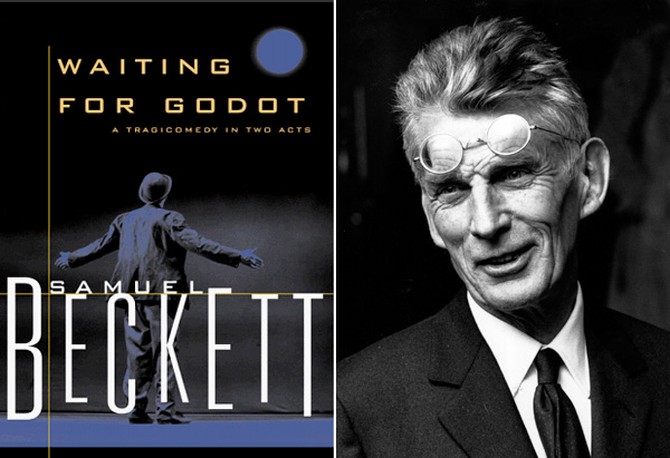
Getty/Reg Lancaster
Samuel Beckett
After earning a degree from Trinity College in Dublin, Samuel Beckett took a teaching post in Paris and became a student, assistant and close friend of James Joyce. Beckett's career began by helping Joyce research his final novel, Finnegan's Wake. Under Joyce's influence, Beckett became a Modernist/postmodernist novelist, essayist, poet and playwright who seemed well-suited to comment on the human condition.
His most famous work, the play Waiting for Godot, was Beckett's first long work to be written directly in French. One of the premier examples of the theater of the absurd movement, Waiting for Godot is a stripped down, existential, two-act tragic comedy in which nothing and everything happens and which remains very popular today.
In 1969, Beckett was awarded the Nobel Prize for Literature. His wife, knowing how intensely private her husband was, called the award, and the fame that would come with it, a "catastrophe." After dying in the same year, they were buried together in Paris under a simple granite headstone that is, per his request, "any colour, so long as it's grey."
Author John Edgar Wideman on Beckett
His most famous work, the play Waiting for Godot, was Beckett's first long work to be written directly in French. One of the premier examples of the theater of the absurd movement, Waiting for Godot is a stripped down, existential, two-act tragic comedy in which nothing and everything happens and which remains very popular today.
In 1969, Beckett was awarded the Nobel Prize for Literature. His wife, knowing how intensely private her husband was, called the award, and the fame that would come with it, a "catastrophe." After dying in the same year, they were buried together in Paris under a simple granite headstone that is, per his request, "any colour, so long as it's grey."
Author John Edgar Wideman on Beckett
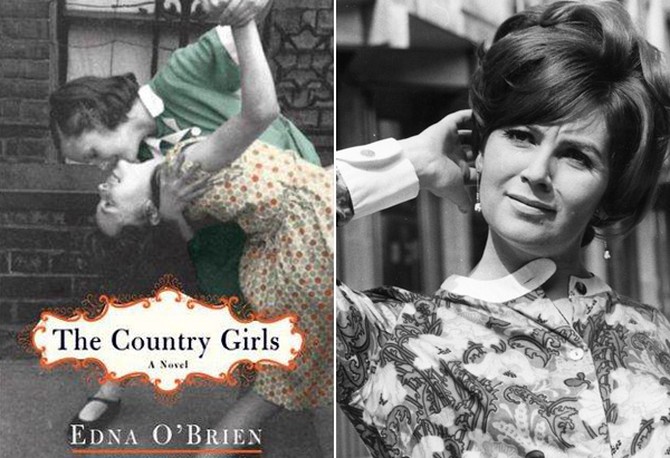
Getty/Evening Standard
Edna O'Brien
The first book Edna O'Brien ever bought was Introducing James Joyce by T.S. Eliot, and she credits Joyce's A Portrait of the Artist as a Young Man for the motivation to pursue literature for the rest of her life. Like Joyce, O'Brien's first novel was the first in a trilogy. The Country Girls (1960) was initially banned, and in some cases burnt, for sexual explicitness. It went on to be a huge best-seller.
O'Brien is credited for paving the way for a new generation of Irish writers such as Anne Enright, Nuala O'Faolain and Colm Toibin. Her 1981 play, Virginia, about Virginia Woolf, was staged in both Canada and London. In 1999, she published a biography of James Joyce. She has received numerous awards for her works, including a Kingsley Amis Award in 1962 and the Los Angeles Times Book Prize in 1990 for Lantern Slides. In 2006, she was appointed adjunct professor of English Literature in University College, Dublin. In 2009, O'Brien was honored with the Bob Hughes Lifetime Achievement Award at the Irish Book Awards in Dublin.
Mary Louise Parker on The Country Girls Trilogy
O'Brien is credited for paving the way for a new generation of Irish writers such as Anne Enright, Nuala O'Faolain and Colm Toibin. Her 1981 play, Virginia, about Virginia Woolf, was staged in both Canada and London. In 1999, she published a biography of James Joyce. She has received numerous awards for her works, including a Kingsley Amis Award in 1962 and the Los Angeles Times Book Prize in 1990 for Lantern Slides. In 2006, she was appointed adjunct professor of English Literature in University College, Dublin. In 2009, O'Brien was honored with the Bob Hughes Lifetime Achievement Award at the Irish Book Awards in Dublin.
Mary Louise Parker on The Country Girls Trilogy
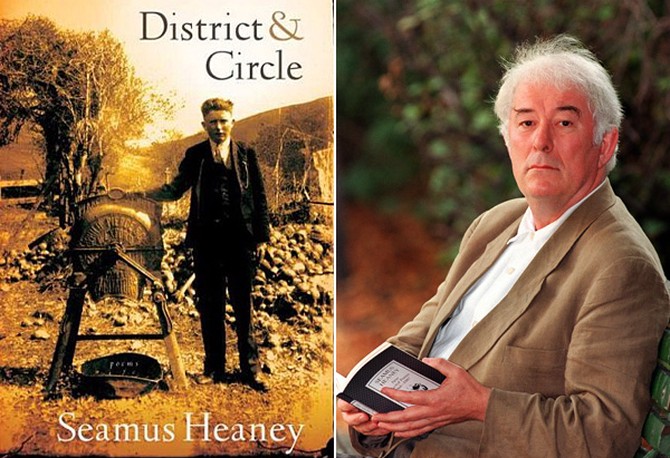
getty/Johnny Eggit
Seamus Heaney
While studying in university, Seamus Heaney found a copy of Ted Hughes' Lupercal, and he later said, "Suddenly, the matter of contemporary poetry was the material of my own life."
Beginning with a Somerset Maugham Award for his 1966 poetry collection, Death of a Naturalist, Heaney went on to win many awards, including the 1995 Nobel Prize for Literature. Since, Heaney has continued to garner praise for his works including two Whitbread (now Costa) Book of the Year awards and the 2006 T. S. Eliot Prize for District and Circle.
Currently living in Dublin, Seamus Heaney leans heavily on his Northern Ireland upbringing for inspiration. Rarely overtly political, on the surface his poems observe the small details of the everyday, of history and of family. However, in 1982, he politely objected to his inclusion in the Penguin Book of Contemporary British Poetry by writing, "Be advised, my passport's green / No glass of ours was ever raised / To toast the Queen."
More of our favorite Irish imports
Beginning with a Somerset Maugham Award for his 1966 poetry collection, Death of a Naturalist, Heaney went on to win many awards, including the 1995 Nobel Prize for Literature. Since, Heaney has continued to garner praise for his works including two Whitbread (now Costa) Book of the Year awards and the 2006 T. S. Eliot Prize for District and Circle.
Currently living in Dublin, Seamus Heaney leans heavily on his Northern Ireland upbringing for inspiration. Rarely overtly political, on the surface his poems observe the small details of the everyday, of history and of family. However, in 1982, he politely objected to his inclusion in the Penguin Book of Contemporary British Poetry by writing, "Be advised, my passport's green / No glass of ours was ever raised / To toast the Queen."
More of our favorite Irish imports
Published 03/10/2010

